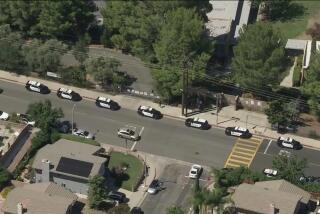Fighting Hurt With Hope : Education: Two women whose sons were killed at school launch a group to stem an epidemic of violence on the nation’s campuses.
- Share via
RESEDA — Sometimes in the night, Margaret Ensley stands in her empty house, crying out for her murdered only son until there are no tears left.
But when she is done, Ensley is still left with the wrenching emptiness that has only deepened since her 17-year-old Micheal was shot to death in the hallway of Reseda High School in February by a teen-ager with a grudge and a .22-caliber derringer.
“I miss him so much, I’ll cry for an hour,” she recalled Monday. “But when I stop I know there will be no change. He still is gone. And there is nothing I can do physically to bring him back.”
But there is something Ensley wants to do for other children and their parents, she says, so that they may never have to suffer as she has. Or if they must suffer, she wants them to at least find solace in sharing their grief with others who have dealt with trauma and loss.
On Monday, Ensley and another mother of a teen-ager who was killed recently at a Los Angeles high school joined forces with two state senators to announce the creation of MAVIS, or Mothers Against Violence in Schools.
The nonprofit group’s goals include counseling teen-agers, parents, teachers and school officials about the growing epidemic of violence in schools, and lobbying for legislative ways to combat such threats to the physical and emotional well-being of the nation’s schoolchildren.
Ensley, 45, bused her son an hour each way to the San Fernando Valley to help him escape the dangers of inner-city life, only to have him gunned down in the hallway between classes. A quiet, dignified woman who works as a sales manager for AT&T;, she said she began setting up the group over the past few months because she fears that there is no escape from the violence that claimed her son. Even the tree-lined campuses of schools such as Reseda High, which were once considered safe and suburban, offer no respite.
Earlier this year, Mildred Hillard of Inglewood also saw her son off to school, never to see him come home. Demetrius Rice, 16, was shot and killed while sitting in English class at Fairfax High School, by a youth his age whose gun accidentally went off.
On Monday, the two mothers returned to Fairfax High with state Sens. Teresa P. Hughes (D-Inglewood) and Diane Watson (D-Los Angeles) to unveil the specifics of the program at a news conference.
The grieving mothers said they will visit local schools to speak on the subject of school violence. They also will lobby for passage of a host of legislative reform measures designed to raise $85 million to improve safety and educational programs at schools, and other bills that would require that some juveniles as young as 14 be tried as adults when murder charges are involved.
Ronald Grigg, a lawyer who acts as a consultant to MAVIS, said the group will continue to testify at congressional hearings and anywhere else necessary to raise awareness of the need for more safety measures at schools, such as metal detectors, and press for increased funding for school-based anti-violence programs and curriculums.
“We need to address the long-term problems, the lack of funding that has helped in the degeneration of public schools,” said Grigg. “We have a president who has his child in private school, for instance. I think that is significant.”
The two mothers also have set up a toll-free hot line, 1-800-ACT-HEAL, that anyone can call if they want guidance about school-related violence, counseling or if they just need someone to talk to. They promised to respond to each call.
There have been other mothers spurred into temporary activism by spasms of grief and loss. But Ensley and Hillard pledged to do something more lasting, so their sons’ lives and deaths would not be in vain.
“We’ve come to realize this is a lifelong commitment we have to our children,” said Hillard, a state employment agency employee. “With the lives we are trying to save, this will turn into a full-time job. . . Something should have been done a long time ago.”
Hughes, chairwoman of the newly created Senate Subcommittee on School Violence, agreed. She said only a multitiered effort to get government, parents and communities to work together will help solve the problem.
“Kids leaving for school today have become soldiers going off to war,” Hughes said after outlining a litany of disturbing statistics about violence at schools. “School violence has become an epidemic.”
“When mothers stand at the door as they wave goodby to their kids,” Hughes said, “they don’t know whether they are ever coming back again.”
Various studies assert that the number of schoolchildren bringing guns and other weapons to school is indeed alarming; in one report, one in five students nationwide in grades six through 12 carried a weapon within the last month, many of them on campus. From newspaper accounts alone, a group called the Center for the Prevention of Handgun Violence reports, 65 students were killed and another 186 wounded by guns used in or around schools between the 1986-87 and 1990-91 school years.
And all indications are that things have gotten much worse since then.
“People don’t realize how many students go to school in fear for their lives,” Ensley said. “They are afraid. And who can they turn to? Teachers don’t understand. And security is lax. My goal is to make it so no child has to say that they are afraid. I don’t ever want to hear those words again.”
For Ensley, who lives in the Athens section of South-Central Los Angeles, there are personal ghosts she also wants to banish.
“This is my way of telling Micheal that I’m sorry I didn’t do more,” she said after the news conference. “It is a debt that I feel I will spend the rest of my life paying. But he didn’t deserve to die that way. No child does.”
More to Read
Sign up for Essential California
The most important California stories and recommendations in your inbox every morning.
You may occasionally receive promotional content from the Los Angeles Times.










